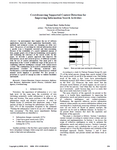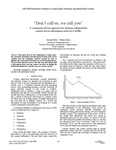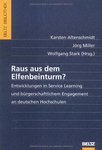ehemalige Mitarbeiter

Ehem. Wissenschaftlicher Mitarbeiter
Dr. Michael Beul
- Homepage:
- www.michaelbeul.de
- Adresse:
- Universität Duisburg-Essen, Campus Essen
Fakultät für Wirtschaftswissenschaften
Lehrstuhl für Wirtschaftsinformatik und Softwaretechnik
Universitätsstr. 9
45141 Essen
Lebenslauf:
Von September 2004 bis März 2013: Wissenschaftlicher Mitarbeiter am Lehrstuhl für "Wirtschaftsinformatik und Softwaretechnik" des Instituts für Informatik und Wirtschaftsinformatik am Fachbereich Wirtschaftswissenschaften der Universität Duisburg-Essen (Lehrstuhlinhaber: Prof. Dr. Stefan Eicker)
Forschungsgebiete:
- Information Retrieval
- Context Awareness
- Information Search Process
- Collective Intelligence/Crowdsourcing
Projekte:
- Service-Learning-Projekte in Kooperation mit UNIAKTIV
Publikationen:
- Beul, Michael; Eicker, Stefan: Crowdsourcing Supported Context Detection for Improving Information Search Activities. In: International Academy, Research; Association, Industry (Hrsg.): Proceedings of The Seventh International Multi-Conference on Computing in the Global Information Technology. (to be published), 2012, S. 254-259. Kurzfassung Details BIB Download
In environments that require the use of software applications, intervals where application functionality, tools, methods and technical systems are changing are often very short. The process of searching for relevant information about a specific issue is frequently executed and time-consuming. Because of the availability of a nearly unlimited amount of data, people spend a lot of time in formulating search queries and evaluating the relevance of the search results. In this paper, we describe a generic approach that improves the information search and retrieval process of different activities with the use of context information. One main goal is the integration of the crowd at different stages of this process by combining collective intelligence concepts with context-aware systems. This combination can be used to automatically reduce information overflow by filtering irrelevant data. Furthermore, a real-time information retrieval process without manual search im pulses is provided. We also present a prototype as a proof of concept in order to validate feasibility and benefit.
- Beul, Michael; Eicker, Stefan: "Don't Call Us, We Call You" - A Community Driven Approach for (Domain Independent) Context Driven Information Retrieval (CoDIR). In: Yetongnon, Kokou; Chbeir, Richard; Dipanda, Albert (Hrsg.): The Fifth International Conference on Signal Image Technology & Internet Based Systems - SITIS 2009. IEEE Computer Society, Marrakesh, Morocco, 2010, S. 458-464. doi:10.1109/SITIS.2009.77Kurzfassung Details BIB Download
This paper discusses the combination of context injection, metadata enrichment and information broking with current semantic web and community oriented concepts in order to optimize the search and retrieval process of relevant information. The presented approach focuses the shift from information pull to information push, and thus reduces the effort on finding the needed information for a specific issue in a concrete context.
- Beul, Michael: Service Learning in der Wirtschaftsinformatik. In: Altenschmidt; Miller; Stark (Hrsg.): Raus aus dem Elfenbeinturm?: Entwicklungen in Service Learning und bürgerschaftlichem Engagement an deutschen Hochschulen. Beltz Verlag, Weinheim und Basel, 2009, S. 156-157. Details BIB Download
- Eicker, Stefan; Beul, Michael; Malich, Stefan; Schuler, Peter M.; Spies, Thorsten: Auf Biegen und Brechen – Flexibilität in betrieblichen Informationssystemen. In: FORUM Forschung 2006/2007 Informatik (2006), S. 86-91. KurzfassungPDF Details BIB Download
Silvester 1999 zogen die ganz Vorsichtigen mit Eiserner Ration und Transistorradio in den Bunker. Schlag Mitternacht, so hatten die Apokalyptiker prophezeit, würden nahezu alle Computerprogramme auf dem Globus ihren Dienst versagen. Chaos, wirtschaftlicher Zusammenbruch und womöglich der Dritte Weltkrieg wären die Folgen. Neurotisches Verhalten auch bei der Einführung der gemeinsamen Währung Anfang 2002. Mancher traute den Computern der Banken die korrekte Division durch 1,95583 nicht zu und räumte vor dem Jahreswechsel sicherheitshalber das Konto ab. In beiden Fällen erwiesen sich die elektronischen Informationssysteme – bis auf ein paar Ausreißer – als ausreichend anpassungsfähig. Abseits derart prominenter Ereignisse werden in Unternehmen und Verwaltungen ständig und teilweise in großem Umfang Anpassungen an den eingesetzten Informations- und Kommunikationssystemen durchgeführt. Meist mit erheblichem Aufwand und nicht immer mit dem gewünschten Erfolg. Der Lehrstuhl für Wirtschaftsinformatik und Softwaretechnik an der Universität Duisburg-Essen arbeitet deshalb an betrieblichen Anwendungssystemen, die die notwendige Flexibilität von Anfang an mitbringen.
- Beul, Michael; Bittscheidt, Christian; Leukel, Jörg; Spies, Thorsten: Behandlung von Informationsdefiziten und -verlusten bei der Transformation von XML-Geschäftsdaten. In: Proceedings der 5. Paderborner Frühjahrstagung "Innovationen im E-Business". 2003, S. 159-168. KurzfassungPDF Details BIB Download
Im Zuge der schnellen Etablierung von XML (Extensible Markup Language) als Metasprache für die Definition von Datenformaten sind zahllose Sprachen für Geschäftsdokumente entstanden, die von proprietären Lösungen bis zu internationalen Standards reichen. Für den zwischenbetrieblichen Geschäftsdatenaustausch und die engere Kopplung von Anwendungssystemen ist XML damit zu einer Basistechnologie geworden. Angesichts des Fehlens von gefestigten, branchenübergreifenden Standards, die sich bereits eine langfristige Verbreitung gesichert hätten, stehen viele Unternehmen vor der Aufgabe, sowohl beschaffungs- als auch vertriebsseitig XML-Daten in unterschiedlichsten Formaten zu verarbeiten. Für elektronische Marktplätze ist die effiziente und kundenorientierte Bewältigung dieser Aufgabe sogar zu einem kritischen Erfolgsfaktor geworden.
Die skizzierte Situation erfordert sowohl technische als auch fachlich-inhaltliche Fähigkeiten, Geschäftsdaten zu verarbeiten und von einem Quellformat in eines oder mehrere Zielformate zu überführen. Der Beitrag adressiert diese Problematik, indem ein fortgeschrittenes Transformationskonzept entwickelt, implementiert und anhand einer Feldstudie aus dem B2B-Bereich evaluiert wird. Grundlagen sind eine Klassifikation von Transformationsfällen und die explizite Berücksichtigung des divergierenden inhaltlichen Umfanges verschiedener XML-Formate, der in der Regel Informationsdefizite und -verluste zur Folge hat.
Vorträge:
- Beul, Michael: Crowdsourcing Supported Context Detection for Improving Information Search Activities. The Seventh International Multi-Conference on Computing in the Global Information Technology, 24. Jun. 2012, Venice, Italy.
- Beul, Michael: "Don’t call us, we call you" - A community driven approach for (domain independent) context driven information retrieval (CoDIR). The Fifth International Conference on Signal Image Technology & Internet Based Systems - SITIS 2009, 29. Nov. 2009, Marrakesch, Marokko. Abstract
This paper discusses the combination of context injection, metadata enrichment and information broking with current semantic web and community oriented concepts in order to optimize the search and retrieval process of relevant information. The presented approach focuses the shift from information pull to information push, and thus reduces the effort on finding the needed information for a specific issue in a concrete context.
Lehrveranstaltungen:
- Paradigmen und Konzepte der Softwareentwicklung 1 (PKS1)
- Paradigmen und Konzepte der Softwareentwicklung 2 (PKS2)
- Praktische Softwareentwicklung (PSE)
- Projektseminar/Studienprojekt
- Bachelor-/Masterprojekte
Begleitete Abschlussarbeiten:
- Konzeption und prototypische Implementierung eines Performance Cockpits(c) für die Automobilbranche zur Unterstützung der Unternehmensführung (Bachelorarbeit Wirtschaftsinformatik, 2019)
- Konzeption und prototypische Realisierung eines Musiknetzwerkes als virtueller Marktplatz unter besonderer Berücksichtigung einer community-basierenden Qualitätssicherung (Diplomarbeit Wirtschaftsinformatik, 2012)
- Benutzeraktivität in Anwendungsprogrammen - Konzeption und prototypische Implementierung eines Systems zur Erfassung des Benutzerverhaltens (Bachelorarbeit Wirtschaftsinformatik, 2011)
- Trendspotting in sozialen Netzwerken - Eine Analyse und exemplarische Umsetzung am Beispiel eines Beratungsportals (Bachelorarbeit Wirtschaftsinformatik, 2010)
- Adaption der Nutzung kontextspezifischer Informationen zur Unterstützung des Informationsmanagements (Masterarbeit Wirtschaftsinformatik, 2010)
- Metadaten-Management zur Anreicherung webbasierter Daten um kontextspezifische Informationen (Diplomarbeit Wirtschaftsinformatik, 2010)
- Adaption des Software-Factory-Ansatzes für Java-Web-Architekturen unter besonderer Berücksichtigung des Open-Source-Umfelds (Diplomarbeit Wirtschaftsinformatik, 2009)
- Analyse von Geschäftsprozessen, Softwarearchitektur und Softwareentwicklungsprozess im Kontext des Einsatzes mobiler Lösungen (Diplomarbeit Wirtschaftsinformatik, 2009)
- Konzepte, Strategien und Vorgehensmodell für die Migration eines Legacy-Warenwirtschaftssystems im Kontext der unternehmensweiten Einführung von Java EE-Technologie (Diplomarbeit Wirtschaftsinformatik, 2008)





